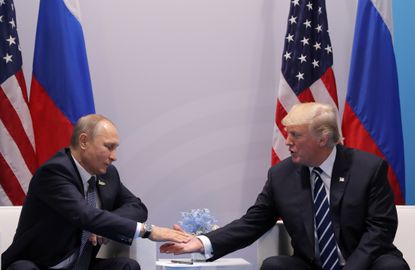Russia and America's new era of lunatic brinksmanship
There is simply no alternative to diplomacy


The nearest great power rival of the Russian Empire in the early 20th century was the rickety Austro-Hungarian Empire. As part of this competition, Russia eagerly encouraged Slavic nationalist movements, especially in Serbia, which wanted to carve off a chunk of the Austrian flank with a large Serbian population. So when Serbian nationalist extremists assassinated the heir to the Austrian throne, Russia backed them to hilt, figuring in part that after an Austrian crack-up, there would be easy territorial pickings for Russia and its allies.
They weren't wrong about the Austrians. But the overall result was comprehensive strategic disaster for all parties. Russian forces were repeatedly and brutally routed by German armies in the First World War. The immense dislocations and poverty induced by the conflict so damaged the Tsarist regime that it collapsed, leading first to a liberal regime and then a communist Soviet Union — ruling a much reduced nation that gave away half its industrial heartland in the Treaty of Brest-Litovsk.
As he faces more sanctions imposed by the United States, Russian President Vladimir Putin should remember this history — as should American members of Congress voting for said sanctions. Attempting to win through blatant espionage or sabotage is often a game not worth the candle. And when it comes to nuclear superpowers, there is simply no alternative to diplomacy on both sides.
Subscribe to The Week
Escape your echo chamber. Get the facts behind the news, plus analysis from multiple perspectives.

Sign up for The Week's Free Newsletters
From our morning news briefing to a weekly Good News Newsletter, get the best of The Week delivered directly to your inbox.
From our morning news briefing to a weekly Good News Newsletter, get the best of The Week delivered directly to your inbox.
It is more or less beyond dispute that Putin's Russia attempted to assist Donald Trump in his rise to the presidency. The circumstantial case tying the hacking of the Democratic National Committee and Hillary Clinton's campaign chairman John Podesta to the Russia government is strong. The way the emails were carefully dribbled out over time, thus causing maximum political damage, speaks for itself. Multiple people in Trump circles — including Donald Trump Jr., Jeff Sessions, Jared Kushner, Michael Flynn, and Michael Cohen — have admitted to meeting with Russian representatives during the campaign, often changing their story multiple times in the process.
The probable objective for such espionage is clear: to select a more Russia-friendly U.S. president, one who might relax sanctions on Russia and/or stop the rather mindless eastwards march of NATO.
Now, this did not singlehandedly put Trump into power, nor does it excuse Hillary Clinton for her wretched campaign or her failure to put forth a policy program more appropriate to the national mood (or indeed to run on the platform she had). Nor is there any evidence that Russians actually meddled with vote totals. But Putin had the motive, the means, and the opportunity to help Trump.
If this did actually happen, then no doubt Putin was beside himself with glee at the ease with which it was done. For a few tens of thousands of rubles' worth of computers and hacker time, he humiliated the arrogant American empire and helped install one of the biggest chowderheads of all time as president. I bet he laughed himself silly over that one.
But now it seems he miscalculated. It turns out that Trump is too stupid, corrupt, and incompetent to actually shift American policy towards Russia. Instead, the old nationalism is rearing its head, with more sanctions on Russia passed almost unanimously through Congress. All this is rapidly escalating to a major diplomatic spat, as Putin retaliated by demanding the U.S. cut three-fifths of its diplomatic staff in Russia.
Meanwhile, the American state is visibly rotting before our eyes, as Trump refuses to even nominate people to run absolutely vital government departments. The Department of Energy — which not only oversees America's nuclear arsenal, but has also previously worked with Russian forces to secure loose nuclear material — is missing 21 out of 22 political appointees.
It turns out — as Tsar Nicholas II discovered to his eternal regret — inflicting political chaos on a strategic adversary is a risky proposition. That holds doubly true for a state as immensely powerful as the United States, even in its weakened state. (Even a sick elephant can easily crush you to death without trying — indeed, it might be more likely to do so.) The negative consequences will not be the same as they were in 1914 — but they might be even worse.
So what is to be done about Russia? The answer can only be diplomacy. President Obama — who clearly shared with Putin a mutual hatred and suspicion — grasped this intuitively. As Soviet Premier Nikita Khrushchev wrote to President Kennedy at the height of the Cuban Missile Crisis:
Mr. President, we and you ought not now to pull on the ends of the rope in which you have tied the knot of war, because the more the two of us pull, the tighter that knot will be tied. And a moment may come when that knot will be tied so tight that even he who tied it will not have the strength to untie it, and then it will be necessary to cut that knot, and what that would mean is not for me to explain to you, because you yourself understand perfectly of what terrible forces our countries dispose. [JFK Library]
That potential danger is no less today than it was in 1962. Before either Russia or the United States go further down the road towards confrontation, they should remember their history. We have many times avoided disaster through prudence and de-escalation. But for that to work, it must first be tried.
Sign up for Today's Best Articles in your inbox
A free daily email with the biggest news stories of the day – and the best features from TheWeek.com
Ryan Cooper is a national correspondent at TheWeek.com. His work has appeared in the Washington Monthly, The New Republic, and the Washington Post.
-
 One great cookbook: 'The Zuni Café Cookbook' by Judy Rodgers
One great cookbook: 'The Zuni Café Cookbook' by Judy RodgersThe Week Recommends A tome that teaches you to both recreate recipes and think like a cook
By Scott Hocker, The Week US Published
-
 Stephen Miller is '100% loyal' to Donald Trump
Stephen Miller is '100% loyal' to Donald TrumpHe is also the architect of Trump's mass-deportation plans
By Joel Mathis, The Week US Published
-
 Crossword: November 14, 2024
Crossword: November 14, 2024The Week's daily crossword
By The Week Staff Published
-
 US election: who the billionaires are backing
US election: who the billionaires are backingThe Explainer More have endorsed Kamala Harris than Donald Trump, but among the 'ultra-rich' the split is more even
By Harriet Marsden, The Week UK Published
-
 US election: where things stand with one week to go
US election: where things stand with one week to goThe Explainer Harris' lead in the polls has been narrowing in Trump's favour, but her campaign remains 'cautiously optimistic'
By Harriet Marsden, The Week UK Published
-
 Is Trump okay?
Is Trump okay?Today's Big Question Former president's mental fitness and alleged cognitive decline firmly back in the spotlight after 'bizarre' town hall event
By Harriet Marsden, The Week UK Published
-
 The life and times of Kamala Harris
The life and times of Kamala HarrisThe Explainer The vice-president is narrowly leading the race to become the next US president. How did she get to where she is now?
By The Week UK Published
-
 Will 'weirdly civil' VP debate move dial in US election?
Will 'weirdly civil' VP debate move dial in US election?Today's Big Question 'Diametrically opposed' candidates showed 'a lot of commonality' on some issues, but offered competing visions for America's future and democracy
By Harriet Marsden, The Week UK Published
-
 1 of 6 'Trump Train' drivers liable in Biden bus blockade
1 of 6 'Trump Train' drivers liable in Biden bus blockadeSpeed Read Only one of the accused was found liable in the case concerning the deliberate slowing of a 2020 Biden campaign bus
By Peter Weber, The Week US Published
-
 How could J.D. Vance impact the special relationship?
How could J.D. Vance impact the special relationship?Today's Big Question Trump's hawkish pick for VP said UK is the first 'truly Islamist country' with a nuclear weapon
By Harriet Marsden, The Week UK Published
-
 Biden, Trump urge calm after assassination attempt
Biden, Trump urge calm after assassination attemptSpeed Reads A 20-year-old gunman grazed Trump's ear and fatally shot a rally attendee on Saturday
By Peter Weber, The Week US Published